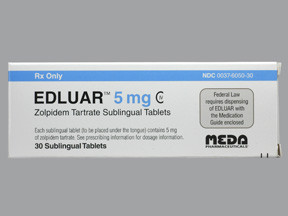ZOLPIDEM - SUBLINGUAL
PHONETIC PRONUNCIATION: (ZOHL-pee-dem)
COMMON BRAND NAME(S): Edluar
GENERIC NAME(S): zolpidem tartrate
Uses
USES: Zolpidem is used to treat a certain sleep problem (insomnia). If you have trouble falling asleep, it helps you fall asleep faster, so you can get a better night's rest. Zolpidem belongs to a class of drugs called sedative-hypnotics. It acts on your brain to produce a calming effect. Use of this medication is usually limited to short treatment periods of 1 to 2 weeks or less. If your insomnia continues for a longer time, talk to your doctor to see if you need other treatment.
How to use ZOLPIDEM - SUBLINGUAL
HOW TO USE: Read the Medication Guide provided by your pharmacist before you start taking zolpidem and each time you get a refill. If you have any questions, ask your doctor or pharmacist. Take this medication by mouth on an empty stomach as directed by your doctor, usually just before you get into bed. Do not take it with or after a meal because it will not work as quickly. Place the tablet under your tongue and let it dissolve. Do not swallow the tablet or take it with water. Although unlikely, this drug can rarely cause temporary short-term memory loss. To lessen the chance of this, do not take a dose of this drug unless you have time for a full night's sleep of at least 7 to 8 hours. If you have to wake up before that, you may have some memory loss and may have trouble safely doing any activity that requires alertness, such as driving or operating machinery. (See also Precautions section.) The dosage is based on your gender, age, medical condition, other medications you may be taking, and response to treatment. Do not increase your dose, take it more often, or use it for longer than prescribed. Do not take more than 10 milligrams a day. Women are usually prescribed a lower dose because the drug is removed from their bodies more slowly than in men. Older adults are usually prescribed a lower dose to decrease the risk of side effects. This medication may cause withdrawal reactions, especially if it has been used regularly for a long time or in high doses. In such cases, withdrawal symptoms (such as nausea, vomiting, flushing, stomach cramps, nervousness, shakiness) may occur if you suddenly stop using this medication. To prevent withdrawal reactions, your doctor may reduce your dose gradually. Consult your doctor or pharmacist for more details, and report any withdrawal reactions right away. When this medication is used for a long time, it may not work as well. Talk with your doctor if this medication stops working well. Though it helps many people, this medication may sometimes cause addiction. This risk may be higher if you have a substance use disorder (such as overuse of or addiction to drugs/alcohol). Take this medication exactly as prescribed to lower the risk of addiction. Ask your doctor or pharmacist for more details. Tell your doctor if your condition persists after 7 to 10 days, or if it worsens. You may have trouble sleeping the first few nights after you stop taking this medication. This is called rebound insomnia and is normal. It will usually go away after 1 or 2 nights. If this effect continues, contact your doctor.
Side Effects
Precautions
Interactions
Overdose
Images
Reviews
Faq for ZOLPIDEM - SUBLINGUAL
Zolpidem sublingual is a medication used for the short-term treatment of insomnia. It belongs to a class of drugs known as sedative-hypnotics.
Zolpidem sublingual works by enhancing the effects of the neurotransmitter GABA in the brain. It helps to induce sleep and maintain sleep throughout the night.
The recommended dosage of Zolpidem sublingual is 5 mg for women and 5-10 mg for men. The medication should be taken just before bedtime and should not be taken with or immediately after a meal.
Common side effects of Zolpidem sublingual may include drowsiness, dizziness, headache, nausea, and diarrhea. Less common but more severe side effects may include memory loss, hallucinations, and sleepwalking.
Yes, Zolpidem sublingual has the potential for addiction and dependence. It should be used only as directed and for the shortest duration possible to avoid such risks. It is advised to gradually reduce the dosage when discontinuing the medication.
Before taking Zolpidem sublingual, it is important to inform your healthcare provider about all the medications you are currently taking, as there may be potential drug interactions. In particular, it should not be taken with alcohol, opioids, or other sedative medications.
Zolpidem sublingual should be used with caution during pregnancy and breastfeeding. It is advisable to consult with a healthcare provider before using this medication in these situations.
Zolpidem sublingual typically starts working within 15-30 minutes after administration. Therefore, it is important to take the medication when you are ready for bed to ensure its effectiveness.
The effect of Zolpidem sublingual may last for up to 7-8 hours. It is important to ensure that you have enough time for uninterrupted sleep when taking this medication.
Disclaimer
IMPORTANT: HOW TO USE THIS INFORMATION: This is a summary and does NOT have all possible information about this product. This information does not assure that this product is safe, effective, or appropriate for you. This information is not individual medical advice and does not substitute for the advice of your health care professional. Always ask your health care professional for complete information about this product and your specific health needs.


No Reviews Yet